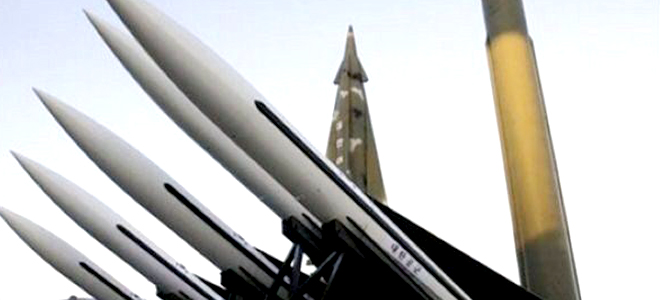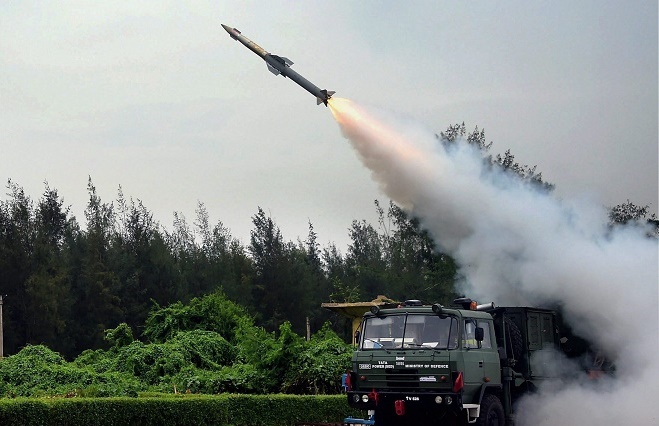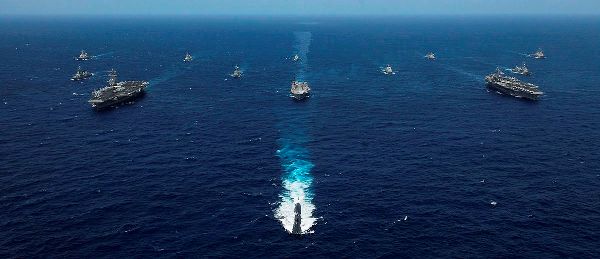
An unrelated file photo.
SEOUL (AFP): North Korea proclaimed on Tuesday that it had successfully tested an intercontinental ballistic missile -- a watershed moment in its push to develop a nuclear weapon capable of hitting the United States.
US experts said the device could reach Alaska, and the launch, which came as the United States prepared to mark its Independence Day, triggered a Twitter outburst from US President Donald Trump who urged China to "end this nonsense once and for all".
The North has long sought to build a rocket capable of delivering an atomic warhead to the continental United States -- something that Trump has vowed "won't happen".
Its possession of a working ICBM will force a recalculation of the strategic threat it poses.
The "landmark" test of a Hwasong-14 missile was overseen by leader Kim Jong-Un, an emotional female announcer said on state Korean Central Television.
It reached an altitude of 2,802 kilometres and flew 933 kilometres, she added.
The North was "a strong nuclear power state" and had "a very powerful ICBM that can strike any place in the world" she said.
There are still doubts whether the North can miniaturise a nuclear weapon sufficiently to fit it onto a missile nose cone, or whether it has mastered the technology needed for it to survive the difficult re-entry into the Earth's atmosphere.
But the isolated, impoverished country has made great progress in its missile capabilities since the ascension to power of Kim, who has overseen three nuclear tests and multiple rocket launches.
In response to the launch but before the announcement, Trump asked on Twitter: "Does this guy have anything better to do with his life?"
The United Nations has imposed multiple sets of sanctions on Pyongyang over its weapons programmes, which retorts that it needs nuclear arms to defend itself against the threat of invasion.
The "unidentified ballistic missile" was fired from a site in North Phyongan province, the South's Joint Chiefs of Staff said in a statement, and came down in the East Sea, the Korean name for the Sea of Japan.
US Pacific Command confirmed the test and said it was a land-based, intermediate range missile that flew for 37 minutes, adding the launch did not pose a threat to North America.
It was estimated to have reached an altitude that "greatly exceeded" 2,500 kilometres, Japan said, prompting arms control specialist Jeffrey Lewis to respond on Twitter: "That's it. It's an ICBM. An ICBM that can hit Anchorage not San Francisco, but still."
David Wright, of the Union of Concerned Scientists, wrote on the organisation's allthingsnuclear blog that the available figures implied the missile "could reach a maximum range of roughly 6,700 km on a standard trajectory".
"That range would not be enough to reach the lower 48 states or the large islands of Hawaii, but would allow it to reach all of Alaska."
The device came down in the Sea of Japan within the country's exclusive economic zone, Tokyo's defence ministry said in a statement, waters extending 200 nautical miles from its coast.
Prime Minister Shinzo Abe told reporters: "This launch clearly shows that the threat has grown."
The US, Japan and South Korea will hold a summit on the sidelines of this week's G20 meeting on the issue, he added.
"Also I will encourage President Xi Jinping and President Putin to take more constructive measures."
South Korea's President Moon Jae-In, who backs both engagement with the North to bring it to the negotiating table and sanctions, and met Trump for a summit in Washington at the weekend, strongly condemned what he called an "irresponsible provocation".
Washington, South Korea's security guarantor, has more than 28,000 troops in the country to defend it from its communist neighbour, and fears of conflict reached a peak earlier this year as the Trump administration suggested military action was an option under consideration.
There has also been anger in the United States over the death of Otto Warmbier, an American student detained in North Korea for around 18 months before he was returned home in a coma in June.
Trump has been pinning his hopes on China -- North Korea's main diplomatic ally -- to bring pressure to bear on Pyongyang.
Last week he declared that Beijing's efforts had failed, but returned to the idea on Twitter following the launch: "Perhaps China will put a heavy move on North Korea and end this nonsense once and for all!"
But a former foreign policy adviser to Hillary Clinton warned that his comments risked undermining the credibility of both the US deterrent, and its assurances to its allies in Seoul and Tokyo.
She added: "Picking a twitter fight with a nuclear-armed dictator is not wise - this is not reality TV anymore."
 Previous Article
Previous Article Next Article
Next Article













The Indian Air Force, in its flight trials evaluation report submitted before the Defence Ministry l..
view articleAn insight into the Medium Multi-Role Combat Aircraft competition...
view articleSky enthusiasts can now spot the International Space Station (ISS) commanded by Indian-American astr..
view article